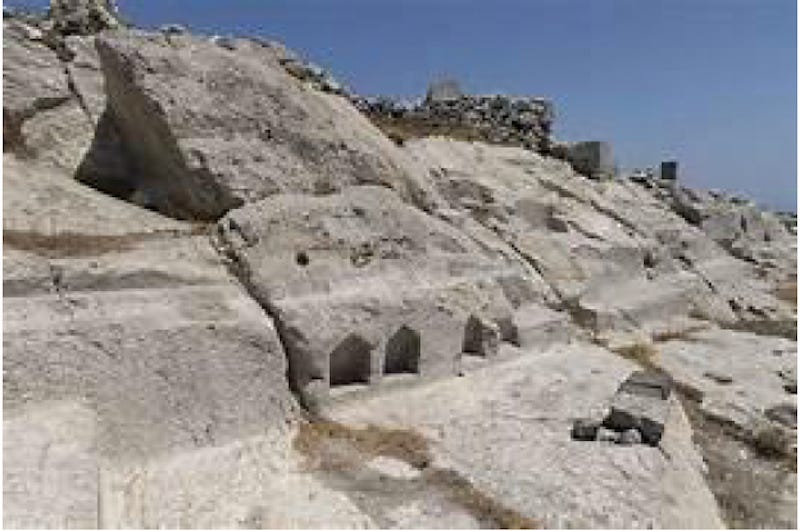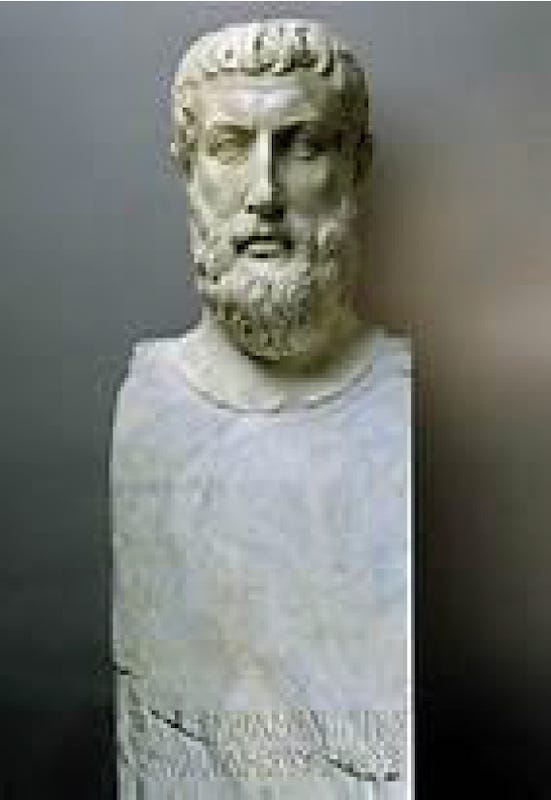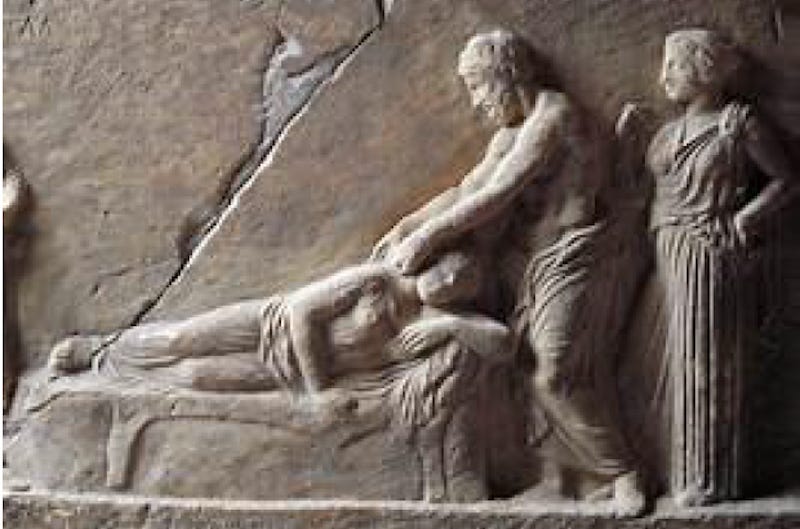Those of you reading our monthly “Temenos” essays probably should be reminded why we’re using such an unusual word to announce our writings. It all started years ago by randomly picking out a book from a friend’s library to read on our upcoming car trip to New Mexico. We’ve done this every fall, and the highlight is me listening to Stacy read from some inspiring book while we drive along the long stretch of roads. It helps the miles fly by. This book, In the Dark Places of Wisdom by Peter Kingsley, was an unexpected treasure. It was an engaging focus on Parmenides - a Greek philosopher from around 500 BCE. He mentions going into a “temenos” which refers to a sacred place where those seeking a healing or divine guidance would go - it could be a cave, or a special room in a temple. The basic idea was to provide a place for those seeking healing to stay absolutely quiet - it was called an incubation. Parmenides continued the tradition, and used a temenos to gain clarity for his own developing philosophy of life.
The above picture is an example of a temenos at Artemidoros among the Ruins of Thera. This site is on the island of Santorini, which had been destroyed in a volcanic explosion. The temple of Artemidoros was hand-carved out of solid rock in the 3rd Century BC by Artemidoros, son of Apollonios.
While re-reading Kingsley’s book these past several months, I received new insights into what the mythical heroes, gods, and goddesses are all about. In my own “classical” education, I was introduced to the myths, and spent several months in Greece and Italy (1968) as a senior in college. There was always a nagging suggestion that these ancient gods and goddesses had actually been real people - or at least demi-gods (hemitheos). I always wanted to time travel back to the Greek “Golden Age” and snoop around to see if that was true. I grew up admiring Plato and Aristotle - of course that was the normal thing to do, being a philosophy major. I did struggle with the intellectualizing that went
into studying the ancient Greek philosophers, and it still is what motivates the field today. Getting lost in the world of the intellect helped me stop trying to be a philosopher myself. It was almost as if Plato was making up stuff to get me to agree with whatever he was saying. And then (50 years later!) a breath of fresh air blew in my face. Peter Kingsley had not been fooled by Plato’s assertions. He even took apart Plato’s work, Parmenides, and showed how he made up facts to fit his points. I was hooked again.
Parmenides head found in 1960, and then attached to the marble inscription found in 1962, the bottom of which reads “Parmenides, son of Pyres Ouliadês Physikos” - and translated by Peter Kingsley (p. 140, In The Dark Places of Wisdom). Notice the marble on the bottom doesn’t match the marble of the head.
Parmenides really defined what it meant to be a metaphysician. He espoused a world without duality, so he was called a “monist”. He flourished in a Greek colony in southern Italy, Velea, which became Elea, and his teachings became the school of Eleaticism. A 1st century portrait head of Parmenides was found in 1960 in what’s now called Castellamare della Bruca. Its inscription read: “Parmenides, son of Pyres, Ouliadês, Natural Philosopher”. This inscription associates him with the cult of Apollo Oulios - or Apollo the Healer. His enigmatic writings confirm over and over that “what is, is” and the rest of what humanity confronts is illusion. And he doesn’t make it easy for us in the 21st Century to understand him. All we have to go on is from a poem of 800 verses, of which only 160 verses have survived. And those 160 verses are just what other ancient philosophers copied down and quoted.
Even though I earned an undergraduate degree in philosophy, Parmenides wasn’t even a footnote. I studied all the “standard fare” philosophers like Plato and Aristotle, and they kept me steeped in the intellectual side of thinking. Lately, my natural philosophical thought has been clarified: out with duality - I affirm oneness (something most of humanity calls naïve, unrealistic, or at best not relevant!). Along comes Parmenides, also often ridiculed or at least sidelined as too primitive and way outside the mainstream intellectual thought. Let’s get into Parmenides’ poem, which used the traditional epic medium of hexameter verse. These following thoughts are guided by James Cowan, author of One, Parmenides and His Vision (posthumously printed in 2022). Parmenides is on a spiritual quest (our modern term for what he was doing). He was guided by a goddess, Persephone - Queen of the Underworld, wife of Hades. We find him riding along in a “whirling” chariot, with a team of mares. He is welcomed into the underworld, not a normal activity since one is usually dead to be doing that. He’s dying without dying. While being instructed by his goddess, he refers to the “...notions of mortals, in which there is no genuine trustworthiness” (f.1.30). Early in the 2nd section, called “The Way of Truth”, I quote James Cowan’s translation:
Listen, & I will tell you - what I say must
Be stored in your mind, & never forgotten:
Apprehending & being are one & the same.
It is can never be confused with not-being
For such is Truth, your constant companion.
What is not can never be, not now
Or in the future, however much you might
Wander down various pathways, hoping
To distance yourself from the unity of One.
Remember, what is not cannot be known
Nor can it be properly uttered, impossible!
It’s a contradiction, a two-headed beast
Befuddling a confused mind, amazing everyone
For whom being & not-being are thought of
As the same, an entrance to a blind alley.
Cowan gives us clues as to how to put these ideas into practice in today’s world. He spent the last days of his life doing just that, and this is inspiring to me, since deep down inside I know all is One, and it is wonderful to find a fellow true philosopher who understands how to actually live these concepts. He relates how we have the possibility of being half-gods (mentioned earlier as hemitheos) and this really means living the metaphysical life. There is a long list of humans who became gods/goddesses such as Hercules, Pandora, Midas, and Narcissus, to name a few.
If One is able to inhale the void and exhale a fully formed universe as some ancient philosophers tell us (speaking metaphysically), is it not possible for us to find a way to make primordial thinking a part of the very fabric of our lives once more, just as they did?...Parmenides tells us that One overarches Being and, as a consequence, being-in-the-world. As remote as it is, One is nonetheless every-present in everything that constitutes being and its physical composition, including change, diminution, and renewal. Such is the miracle of One: it has the power to be All in all while never actually being present.
(pp 108-109, One, Parmenides and His Vision)
So, let’s “make primordial thinking a part of the very fabric of our lives” - I believe that means living metaphysically, or living in a way so foreign to everyone around us - living in a constant consciousness of Being, of being surrounded by divinity - call it gods and goddesses around us all the time. An important aspect of Parmenides’ trip down into the Underworld was being initiated as a “son” of Apollo. That was the language of 2500 years ago. James Cowan finished his book by saying the following about not turning our backs on the world:
All he is asking us to do is to recognize that unity, the absolute completeness of Being (oulomeles), is of far greater importance to our inner wellbeing and health than any perceived sense of security that we might wish to achieve through our daily life activity. Preserving our place in the world as individuals is of less importance than in learning how to celebrate the awful glory of One. Only this can be defined as the Way of Truth. (awful = full of awe!)
(page 113 - One, Parmenides and his Vision)
Here we are - invited to live our lives in a more metaphysical way. Perhaps the next article will work on how to make that happen! Remember - only Being is….








David, thanks for this post. Whenever I've gone to Greece, yes I think the gods and goddesses are with me. I look forward to a fuller discussion of this next time I see you. For many years Artemis has been my guide. Demeter for her mother being. And lately Athena for her fight. One of my favorite books of all time is Amor and Psyche by Eric Neumann.